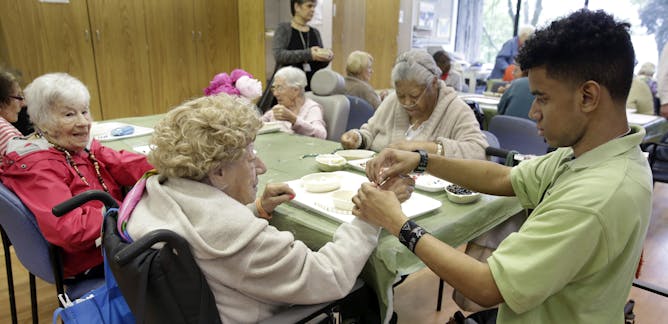
Articles on Elderly
Displaying 1 - 20 of 171 articles

Governments can do more to protect patients at for-profit nursing homes. A behavioral scientist who studies nursing homes weighs in.

Automobile technology provides opportunities for older drivers to maintain their independence and autonomy, but cars need to be designed with their needs in mind.

Dementia does not manifest solely as a memory problem. People with dementia can also experience issues with learning, comprehension and judgement, but they may also experience changes in behaviour.

Extreme heat and bushfires bring unique challenges for someone with dementia. Here’s how we can all play a part in helping them stay safe and cool this spring and summer.

Publicly funded primary and home care should be accessible to all older adults, regardless of where they live.

An accurate prediction of survival can enable earlier conversations about preferences and wishes at the end of life, and earlier introduction of palliative care.

Alarmingly, about half the people exposed to wildfires in Washington and Oregon were those least able to afford to protect their homes, evacuate safely and recover.

While both nursing homes and home care impose financial burdens, their differing structures can influence how older Canadians save money.

Dementia care in South Asian households is shaped by cultural, familial and societal forces that bring benefits and challenges.

What is life like at 100? Centenarians shared their joys and future hopes with a team of Saskatchewan researchers.

Intergenerational Day serves as a reminder of what the old and young can learn from one another, as well as the benefits that come from connecting with others.

Elderly people living in aged care are among those most at risk. But not enough are getting vaccinated as we approach winter.

The number of elderly people in need of support in Africa is projected to grow at annual rates above 3% up to 2050.

COVID-19 is the third-leading cause of death in Canada, but it’s older people who are dying. That we accept this and carry on as if the pandemic is over reveals our ageism: We don’t value older people.

To reduce ageist perceptions of older people, we should encourage collectivist norms and the importance of acting for the common good.

Repeated storytelling from elderly relatives doesn’t necessarily always signal age or cognitive decline. It’s about conveying memories and values to a new generation.

Dancing requires physical, social and cognitive engagement and, as a result, it may bolster a wide network of brain regions.

Many of the world’s most powerful and aspiring leaders are aging or elderly men. That’s a big problem.

Higher Social Security benefits can significantly reduce the odds of an older person’s being food insecure.

Think again if you assume only older people are isolated by technology.





